
Antoine and Antoinette
Antoine and Antoinette, Jacques Becker’s 1947 ode to the everyday life of working-class Parisians, opens amid the rhythmic, pounding machinery of a printing press. Antoine runs a machine that slices the edges off book blocks: we see the blades coming down and the white strips of paper falling away. Narrative cinema in the Hollywood studio style is trimmed just as ruthlessly: all that’s extraneous, or that dulls the pace, is cut away. What makes Becker so radical a director was his interest in just these things that are usually discarded: the space around events, the in-between moments when we see people just being. He called it “dead time,” but it is filled with life, whether it’s Jean Gabin’s middle-aged gangster making the bed and brushing his teeth in Touchez Pas au Grisbi (1954), or Antoinette ironing a new polka-dot dress while her husband listens to a ham radio in their little garret. It’s not a day in the life, it’s the life in a day.
A portrait of a marriage, Antoine and Antoinette is also a film with two identities, harmonious complements. The first half is pure quotidian realism, setting up the lives of the young married couple: where they work, where they shop, who their friends are, what they do on Sundays. The only element of drama comes from a middle-aged grocer who shamelessly pursues Antoinette, courting her with fresh leeks and free sardines, and even buying a new bicycle wheel for her husband. His attentions naturally cause some jealousy and friction, but there is never any question of the wife giving in. The second half of the film is intricately plotted and somewhat contrived, as Antoine and Antoinette realize they have a winning lottery ticket, only to lose it, think they’ve found it, think they’ve lost it again, and finally…but I won’t spoil it.
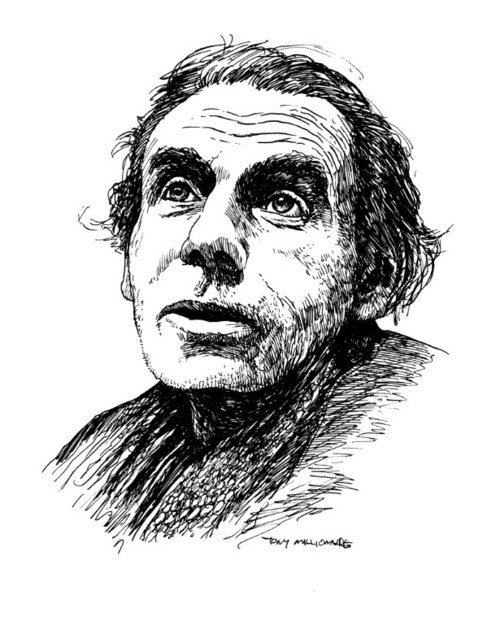
Everybody’s Wrong About Celine
Readers—especially the academic sort—who have read anything by or about Louis-Ferdinand Celine are in the bad habit of drawing some mighty extreme conclusions about him very quickly. He was a Nazi, they say, or insane, or just plain old Evil.
Unfortunately these people, who for the most part seem to have based their opinions on what others have told them, are wrong. (I would add “and stupid dumb-heads” there, too, but I’m trying to maintain a certain tone.)
Celine was one of the most absurdly contradictory figures in literature, and today some fifty years after his death, he remains among the most hated. To understand why, we need to back up a ways.

The Return of the Past That Never Was
Sitting on our old car seat on the front porch last night, as we do most evenings, watching the sun drift down, I got to thinking about the function of memory as the key to the past.
Our generation, and even my elder daughters’ generation, tend to wonder how and if the kids who’ve grown up with instant “presence” – the ability to immediately share the sights, sounds and broad spectrum of present reality – will be able to understand a world (our world) where events could not be shared as a matter of course.
But what I was thinking about at twilight was the fact that we and all the generations of roughly the last two centuries suffer from a similar inability to imagine the hundreds of thousands of years when the past existed only as personal memory and communal consensus.
Until the invention of photography in the early 19th century, all events died without physical trace. Yes, an artist might attempt to reproduce a face, a set of attributes, a battle scene, but the result was filtered through conflicting memories and the unique, often idiosyncratic attitude of the artist.
Printing was the first development to “freeze” an aspect of the past: For the first time, a specific collection of words could be reproduced exactly, in quantity, without the inevitable human lapses and errors of a Bartleby. As a result, oral poetry – the recited epic of Homer – already in decline, largely disappeared. Such prodigious arabesques of memory where no longer needed. (I’ve often wondered what new ways of cadging change the literate blind devised.)
But photography upended memory itself. Not just written words, but the exact lineaments of everything visual could be recorded (if initially without color), fixed in place, and reproduced essentially without limit. Uncle Eustace, in his twenties, could live not only into his old age, but into the old age of his grand- and great grandchildren.
The camera, the mechanical child of physics, has no attitude, no personal investment, no “outlook.” You may quibble, of course, that the image depends on the angle of shooting, the stance of the photographer, the limitations of materials and manufacture. But any two cameras, of the same type and quality, will produce essentially the same picture when the conditions are equal. With photography, individual memory and common consensus were trumped by an independent record that could be pointed to and declared definitive.

Whacky Hijinks and Bumbling Antics: The Ritz Brothers
Vaudeville produced a slew of comedy teams who went on to hit it big in the movies and remain deeply revered to this day, in some cases almost a century after their stage debut: The Marx Brothers, Laurel and Hardy, Abbott and Costello, The Three stooges.
Then there were The Ritz Brothers.
They were hugely popular headliners in vaudeville, but their career in Hollywood was a brief and mostly inauspicious one, marked by low budget films, a much-publicized walkout, and an industry that didn’t know quite what to do with them. Today most people would probably be hard pressed to name all three Ritz Brothers. Or even one.
Al, Jimmy, and Harry Joachim were born and raised in New Jersey (together with a sister and another brother) the children of Austrian immigrants. Al, the oldest, was the first to begin performing in vaudeville as a dancer, adopting the name Ritz along the way after seeing it on the side of a laundry truck. Jimmy and Harry soon followed, both adopting the name Ritz as they tried to get solo careers underway.

Jack Black’s Doctor Judas: Opium
Jack Black was a hophead but it wasn’t for kicks that he took up the opium pipe, though when he was perfectly honest with himself, and that was plenty of the time, he would freely admit that he was predisposed.
After a long night of concentration soft stepping the second story of a sleeping citizen Jack said the only thing that helped him come all the way back down after the tortured silence of the job was the deep breath and pleasant dreams proffered by a draw upon a pill of opium.
Years later, in the long dark of the San Francisco jail, first on Broadway and then, after the 1906 earthquake wrecked it, in the Ingleside city jail, Black was known as the king of hop and as convict commerce he dealt in it and fairly ruled his barred roost, keeping himself supplied as well (eating a pill instead of smoking).
Jack Black wrote later that he never regretted a thing, not jail, not the life of an addict. He put it all down to learning something new, what he had to know to go on purposefully surviving. Even so, by the close of the year 1911, after more than half a dozen lost years in jail, he was tired and sick as well. He thought he would die anyway but he wanted to die on the outside, not behind bars once and for all. He planned an escape.
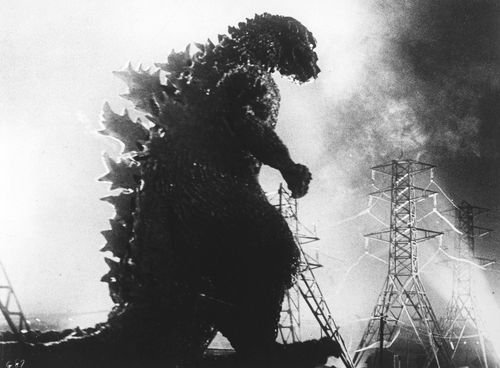
Japan’s Dream of Reason
In March of 2011 when the news first broke concerning the earthquake, tsunami and forthcoming nuclear meltdown in northern Japan, it was immediately clear to some of us that we were witnessing the unmistakable handiwork of Godzilla. That the radioactive monster’s latest rampage was at the core of the disaster was of course blacked out by the likes of CNN, the BBC, the New York Times, all the major Japanese news outlets,—even Al-Jazeera—out of obvious fears over what sort of blind, bloodthirsty panic news of a giant radioactive monster on the loose might spark around the globe. But the evidence was as clear as a kaiju footprint on the beach, and it had been laid out clearly again and again over half a century of Godzilla films. You put together a major seismic and oceanic disturbance followed immediately by the destruction of a nuclear facility, there is only one suspect to consider. Add it up, people!
Perhaps realizing how very obvious it all was and that it wouldn’t be long before the masses began demanding the truth, the story went dark everywhere. We suddenly stopped hearing about Fukushima, about the deadly radiation levels spreading across the country, and the already devastating effects seen in plant, animal, and human life as far south as Tokyo. Stop reporting a story and everyone will simply assume that everything’s A-OK, all is well in hand, and Godzilla’s gone back to sleep on the ocean floor. In the best case scenario, they’ll completely forget it ever happened, distracted as they are by the latest Lindsay Lohan scandal or the latest feud among the American Idol judges.
Two and a half years after Godzilla’s attack, any disturbing news that does come out of Fukushima only seems to appear on irrelevant do-gooder environmentalist websites. And even that news is downplayed as “no big deal” by the mainstream media and the Japanese government, both of whom are much more excited at this point to tout plans to transform the site of the (at the moment) second-worst nuclear disaster in history into a thriving theme park in which tourists wearing radiation suits and respirators will be able to tour the contaminated grounds, what’s left of the crippled reactor and pose for amusing photos with workers still struggling to clean up the devastation and keep the leaks under control.
Meanwhile comes word that earlier this month poisoned steam was once again spotted rising from the reactor. Much more troubling, however, was the news that a nearby volcano had just erupted spreading ash over the area, and that an estimated 300 tons of radioactive water from the reactor is being pumped into the ocean every day.
What’s not being reported of course, is that the two are likely connected. As the Godzilla films have illustrated, a volcanic eruption is as sure a sign heralding the arrival of a new giant monster as an earthquake or a tsunami. Which monster we’re dealing with is not yet known—perhaps Rodan or King Ghidorah—but as suicidal as it may seem, it may help explain the dumping of so much radiation into nearby waters.
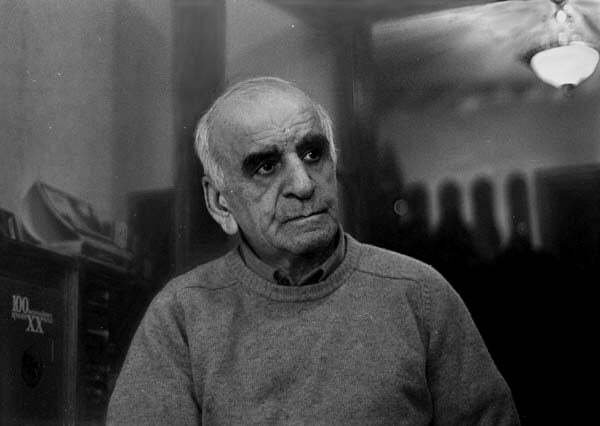
Peleshian: Life & Nothing Less
For over sixty years, Artavazd Peleshian—Артавазд Пелешян; Արտավազդ Փելեշյան—has been slowly sifting through the mountain of debris that has built up around the cinema. His films seem to intrude upon a present which smugly believes that it has solved all the old problems from a static horizon, that all is over and done with, that everything has been settled. What is left is merely the production of ghosts.

Elements of Surprise
The TV series Sapphire and Steel began in 1979 and ran intermittently for a few years. It’s a mysterious show. One of the mysteries is why I didn’t watch it as a kid – there it was, one of the few fantasy series on TV, while I was addicted to Doctor Who and Blake’s 7. It could be because, for some reason, we didn’t watch much ITV – maybe there was some middle-class aspiration in the household that kept the dial defaulting back to BBC? And yet I watched Quatermass that year, on ITV, religiously. I once realized, after not seeing that show for ten years, that I could still recite the creepy nursery rhyme from memory, that’s how much of an impression it made on me.
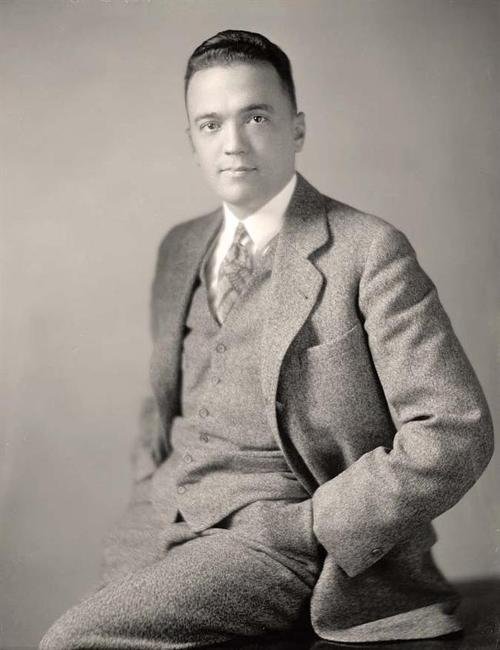
J. Edgar, Lady of the Night
When The Chiseler said it had an all-dames issue in the works, I began to think … maybe, just maybe, J. Edgar Hoover might quality.
No, I don’t believe half the cross-dressing tales (none of them, actually – way too chancy for him to be involved in something like that), but s/he’s an interesting study in the psychic bondage of old-style, iron-clad gay coverup and denial. But maybe also of something more.
Of course, gays had to hide in the closet back then (even under the carpet), but they didn’t have to hunt down their own, as did Hoover and his forever live-in and top deputy, Clyde Tolson. Going after gays was one for Hoover’s many FBI obsessions.
By any account, Hoover was an over-the-top sonofabitch. He ran the FBI and its forerunner for almost 50 years, intimidating presidents and making himself into a impregnable fortress. (LBJ’s comment, roughly remembered, on why he didn’t fire Hoover: “Better to have the bastard inside the tent pissin’ out than outside the tent pissin’ in.”)
Yet over the long haul, and especially during the McCarthy era, Hoover’s image outshone the golden calf. When I was listening to radio programs in the early ‘50s (12 hours a day while not in school), FBI dramas were near the top: “This Is Your FBI,” “The FBI in Peace and War,” “I Was a Communist for the FBI.”
As a young teen, I drank it all in, blindly accepting the idea that we had the most advanced, incorruptible and magnificent law-enforcement agency the world had ever known – one that made Scotland Yard creak like a rusty boxspring.
I didn’t get a good hold on the “evil” of American communism until I saw Communist Party USA General Secretary Gus Hall speak, around 1960. Geez, poor, schlepping absurdity with little or nothing to say and little or no following. Why the hell was anyone ever afraid of these people?
Hoover couldn’t accept anyone detracting from his own glory. In the 1930s, he shouldered agent Melvin Purvis out of the FBI, even though Purvis was the most effective lassoer of miscreants in the organization. Purvis had gotten too much press. And he kept his agents nominally incorruptible by not tackling organized crime, where the real temptations lay.
Anal to the nth degree. Hoover had his desk photographed at the end of the day before the cleaning crew came in, so they could polish its top and then rearrange every item so it would look undisturbed.
I’m quite a fan of books about serial killers. I’ve little urge to kill (most) people, but real evil in the human race is fascinating. In one of those encyclopedias of serial killers and other marauders, the author notes that of all the unindicted offenders, he’d place Hoover near the top. I tend to agree. Hoover probably did as much harm to the country as anyone over his half century, corrupting our sense of what is good, worthwhile and emblematic.
Hoover heaped special venom on those outside the sexual norm. His response to Martin Luther King seems based as much on King’s infidelities as on his political stance. Why such a moralistic concern about overstepping sexual boundaries? It seemed more than a blanket to cover his own at-home liaisons.
I’d never been much concerned with cross-gender confusion until recently. A man trapped in a woman’s body, or a woman trapped in a man’s? I couldn’t see what the real problem was – a minor annoyance at best. Then I started listening to Antony and the Johnsons.
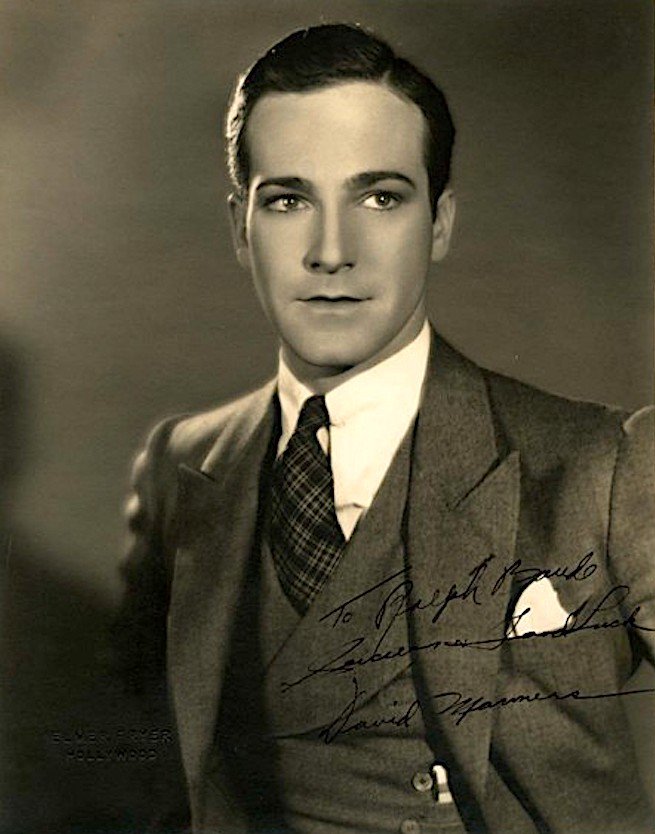
David Manners: Isness and Whatness
When someone describes an actor or actress as “wooden,” what does that mean exactly? It usually refers to the way a performer delivers their lines of dialogue. There are ways we speak in life, which is close to the way people speak in, say, a Robert Altman film, with talk overlapping and sentences unfinished and words being stumbled over, and then there is the way dialogue can be delivered in a movie. Bette Davis never sounds like she just thought of her lines on the spot, whereas Katharine Hepburn had certain tricks that made her lines sound more natural, little stops and starts and hesitations that could start to seem mannered in her lesser work. Acting often settles into such mannerisms, and so it’s amusing that one of the most wooden screen actors of all time, David Manners, had his abiding problem embedded in his last name.

Marius Jacob: Why I Robbed
(Marius Jacob was the leader of a band of anarchist illegalists, the Night Workers, who during a crime wave that lasted from 1899-1903, carried out 106 thefts in France, Belgium and Italy. His band only robbed “social parasites,” priests, soldiers, the bourgeois, and never touched the socially useful. They were forbidden from using deadly force unless their lives were at risk and donated 10% to the anarchist cause. He was sentenced to twenty years of hard labor, but was released in 1925 as the result of a public campaign. His defense speech became a popular pamphlet.)
You now know who I am: a rebel living off the products of his burglaries. In addition, I burned down several hotels and defended my freedom against the aggressions of the agents of power.
I laid bare to you my entire existence as a combatant: I submit it as a problem for your intelligence.
Not recognizing anyone’s right to judge me, I don’t ask for either pardon or indulgence. I don’t go begging to those I hate and hold in contempt. You are the stronger. Dispose of me as you wish; send me to a penal colony or the gallows. I don’t care! But before going our separate ways let me tell you one last thing.
Since you mainly condemn me for being a thief it’s useful to define what theft is.

Voting Genocide
A whopping 87% of the Democratic Party's hardcore constituency, the folks who think Biden's doing "a good job" generally? Well, perhaps it won't surprise you to learn that they also look upon the President's handling of Gaza (i.e., his continued arming of Israel's genocide against the tattered remains of historical Palestine) approvingly. That particular instance of public approval reveals that the vast majority of Ride-or-Die Dems, Biden Supporters... are psychotic. Or, if you prefer, moral imbeciles. "I won't vote for genocide" is a Democratic Party outlier. For, always and everywhere, Dems will see in themselves the sole bulwark against that cliched "Greater Evil," currently embodied by Donald Trump's presence in the election. Alright then, let us sweep aside the Dems' capacity for engaging in banana republic schemes to jail/ knock Mr. Trump out of the electoral arena. Instead, we must return to "the crime of all crimes" and remind ourselves that Democrats vote for genocide, while maintaining their ideological certainty... "We are Lesser Evil-ism at its finest." As Israel systematically starves Gaza's kids, the American President starves ours by doubling, yes DOUBLING, child poverty in one year; and, speaking of Youth, Biden has the chutzpah to look upon anti-genocide protests with disdain, blithely labeling the protesters, Jews prominent among them, "anti-Semitic."
There's no untangling our Imperialism from Israel's Settler Colonialism, after all.
by Daniel Riccuito

